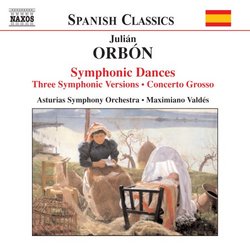| All Artists: Julian Orbon, Maximiano Valdes, Asturias Symphony Orchestra Title: Orbón: Symphonic Dances; Three Symphonic Versions; Concerto Grosso Members Wishing: 0 Total Copies: 0 Label: Naxos Release Date: 2/17/2004 Genre: Classical Styles: Forms & Genres, Concertos, Symphonies Number of Discs: 1 SwapaCD Credits: 1 UPC: 747313236824 |
Search - Julian Orbon, Maximiano Valdes, Asturias Symphony Orchestra :: Orbón: Symphonic Dances; Three Symphonic Versions; Concerto Grosso
 | Julian Orbon, Maximiano Valdes, Asturias Symphony Orchestra Orbón: Symphonic Dances; Three Symphonic Versions; Concerto Grosso Genre: Classical
|
Larger Image |
CD Details |
CD ReviewsA Latin American Master Composer D. A Wend | Buffalo Grove, IL USA | 07/22/2004 (5 out of 5 stars) "This CD provides a marvelous opportunity to become familiar with the music of Julian Orbon. Orbon was born in Spain into a musical family and moved to Cuba when he was in his teens. He also studied with Aaron Copland in the early 1950s. There is mixture European, American and Spanish American influences in his works. Orbon came into conflict with the Castro regime in 1960 and chose exile, eventually in New York where he died in 1991. Recorded here are three of Orbon?s most interesting works. The most popular is the Tres versiones sinfonicas, which was composed in 1954. The first movement sounds much like Copland (although my wife thought it sounded like something Elmer Bernstein might have written for The Magnificent Seven). The music has a cinematic sound one would associate with a rugged western landscape but the themes were inspired by the 16th century composer Luis de Milan. In the second movement, Orbon used a medieval theme from the French composer Pertin and is a quiet, contemplative movement with moments of soaring beauty. Once again, the music is very pictorial. The final part has a Congolese rhythm with a xylophone as the obbligato instrument and brings the piece to an exciting close. The Danzas Sinfonicas were written in 1957 and consists of four movements and have a strong Latin American character. The opening dance, Obertura has an energetic rhythm and bright. The second, Gregoriana, is based on a plainchant melody and the third is a slow dance that is very dramatic. The final dance is based on courtly Spanish dances of the 18th century and is given new life here with a South American modality. The latest work on the CD is the Concerto grosso for orchestra and string quartet. The orchestration is denser but Orbon remains vibrant and inventive with the string quartet and orchestra fencing with each other in the first movement. The slow movement has the strings as the dominant instruments and a religious intensity. The finale resumes the play between the string quartet and the orchestra with a few moments of atonality and also has moments that sound a bit like Copland in the harmony. This music is well played but the Asturius Orchestra and the CD was well received by Gramophone magazine. I have heard the Tres versiones sinfonicas in a recording conducted by the late Eduardo Mata (on the Dorian Label with the Simon Bolivar Orchestra) that to my thinking has a bit more drama to the performance. The Naxos performance, by comparison, is an interesting reading of the score, steady and well phrased. Listeners may want to have both recordings but certainly don?t miss the Naxos disc. " Coplandesque color and charm aplenty, even if there is littl G.D. | Norway | 04/25/2010 (3 out of 5 stars) "Julian Orbon (1925-1991) was born in Spain, spent a significant portion of his life in Cuba where he was involved with the revolution but absconded to Mexico in 1960 due to disagreement over certain ideological points with the regime. His music is tonal and pleasant, sounding more like Copland than anyone else, although lacking Copland's distinctive level of invention. The Three Symphonic Versions date from 1954 and mixes typical Coplandesque gestures with Cuban rhythms and atmospheres in the first movement, draws on medieval music in the second and provides a Coplandesque (again) treatment of Congolese rhythms in the third. It is a colorful if not particularly distinctive work, but is well scored and overall rather attractive.
The symphonic dances from 1957 is again colorful music drawing on a variety of folk music influences, but the most interesting movement is the second, Gregoriana, based on sped-up plainchant melodies. The Concerto grosso is the most interesting work here; it is scored for string quartet and orchestra and is an enjoyable work, even though only the lovely lento attempts to create something more profound than orchestral glitter. Overall, the playing is colorful and rhythmically alert, but the Asturias Symphony Orchestra comes across as uncomfortably tentative at occasions - much of the color and spirit is there, but the music needs more swagger and freedom than it gets here. Still, this is a very worthwhile release which should definitely appeal to lovers of Copland in Mexican mood." |

 Track Listings (10) - Disc #1
Track Listings (10) - Disc #1